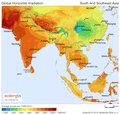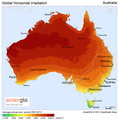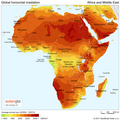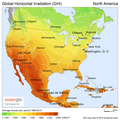| Main page | New articles & Tasks |
 The Energy Portal Welcome to Wikipedia's Energy portal, your gateway to energy. This portal is aimed at giving you access to all energy related topics in all of its forms.
|
Page contents: Selected article • Selected image • Selected biography • Did you know? • General images • Quotations • Related portals • Wikiprojects • Major topics • Categories • Help • Associated Wikimedia |
Introduction
Energy (from Ancient Greek ἐνέργεια (enérgeia) 'activity') is the quantitative property that is transferred to a body or to a physical system, recognizable in the performance of work and in the form of heat and light. Energy is a conserved quantity—the law of conservation of energy states that energy can be converted in form, but not created or destroyed; matter and energy may also be converted to one another. The unit of measurement for energy in the International System of Units (SI) is the joule (J).
Forms of energy include the kinetic energy of a moving object, the potential energy stored by an object (for instance due to its position in a field), the elastic energy stored in a solid object, chemical energy associated with chemical reactions, the radiant energy carried by electromagnetic radiation, the internal energy contained within a thermodynamic system, and rest energy associated with an object's rest mass.
All living organisms constantly take in and release energy. The Earth's climate and ecosystems processes are driven primarily by radiant energy from the sun. The energy industry provides the energy required for human civilization to function, which it obtains from energy resources such as fossil fuels, nuclear fuel, renewable energy, and geothermal energy. (Full article...)
Selected article
Most petroleum is extracted from oil wells found in oil fields. Although it is also possible to extract petroleum from oil shale or tar sands, both of which are known to exist in large quantities, doing so at low cost and without impacting the environment remains a challenge. The first modern oil well was drilled in 1848 in Azerbaijan, but it was the introduction of the internal combustion engine in the early 20th century that provided the demand that has largely sustained the industry to this day. The top three oil producing countries are Saudi Arabia, Russia, and the United States.
Burning oil releases carbon dioxide into the atmosphere, one of the major greenhouse gases contributing to global warming. Bioethanol and biodiesel are already used to some extent as alternatives, notably in Brazil, as are hybrid electric vehicles. Trials using hydrogen fuel are also in progress. There are further concerns about security of supply, oil price rises and whether world oil production may reach a peak, before declining, as predicted by Hubbert peak theory.
Selected image

Photo credit: Johnson Space Center/NASA
Tropical cyclones feed on the heat released when moist air rises and the water vapor condenses.
Did you know?
- During World War I, the German Army produced shale oil from Yarmouk oil shale deposits in Jordan to operate the Hijazi Railway (pictured)?
- Dennis Spurgeon, formerly chief operating officer at uranium supplier USEC Inc., became the United States Assistant Secretary for Nuclear Energy in 2006?
- Japan Canada Oil Sands Limited was the first offshore oil company to exploit the Athabasca oil sands in Canada?
- Teesside Power Station is the largest combined-cycle gas turbine (CCGT) plant in Europe.?
- The Klaipėda Geothermal Demonstration Plant in Lithuania was the first geothermal plant in the Baltic Sea region?
- Hitachi Zosen Corporation built the first oil tanker in Japan in 1908 per an order by Standard Oil Company?
- Coalbed methane is a form of natural gas extracted from coal beds?
- When constructed in 1906, the Baku–Batumi pipeline was the world's longest kerosene pipeline?
Selected biography
Born in Ireland, Thomson studied at the University of Glasgow, Scotland. On graduating, he became a mathematics teacher at the Royal Belfast Academical Institution. During his life Thomson published more than 600 scientific papers and filed over 70 patents.
As early as 1845 Thomson pointed out that the experimental results of William Snow Harris were in accordance with the laws of Coulomb. Over the period 1855 to 1867, Thomson collaborated with Peter Guthrie Tait the Treatise on Natural Philosophy that unified the various branches of physical science under the common principle of energy. His inventions included the current balance for the precise specification of the ampere, the standard unit of electric current.
In 1893, Thomson headed an international commission to decide on the design of the Niagara Falls power station. Despite his previous belief in the superiority of direct current electric power transmission, he agreed to use alternating current after seeing a Westinghouse demonstration at the Chicago World's Fair.
In the news
- 22 August 2024 – Russian invasion of Ukraine
- The International Atomic Energy Agency announces an investigation of the Kursk Nuclear Power Plant following accusations from Russia that a Ukrainian drone targeted the power plant. (Reuters)
- 22 August 2024 – Belarus–China relations
- Belarus and China agree to greatly strengthen mutual trade, financial, energy, and security cooperation, which includes enhancing industrial supply chains and collaboration with the Guangdong-Hong Kong-Macau Greater Bay Area. (Reuters)
General images
Quotations
- "There are only two ways to stabilize concentration of greenhouse gases. One is to avoid emitting them in the first place; the other is to try to capture them after they're created. And there are problems with both approaches." – George W. Bush, 2001
- "The planet has a fever. If your baby has a fever you go to the doctor. If the doctor says you need to intervene here, you don't say, 'Well, I read a science fiction novel that told me it's not a problem.' If the crib's on fire, you don't speculate that the baby is flame retardant. You take action." – Al Gore, 2007
- "If the climate researchers' reports are to be believed, global warming is a huge medium and long-term threat, one which could have dramatic consequences such as refugee flows and armed conflicts." – Angela Merkel, 2007
Related portals
WikiProjects
WikiProjects connected with energy:
Other WikiProjects that may be of interest:
Major topics
Major categories
National energy supply, use & conservation
National electricity sector
Politics, economics, environment
- Climate change
- Energy conservation
- Energy economics
- Energy crises
- Energy development
- Energy policy
- Peak oil
Energy sources
- Fuels
- Biofuels
- Fossil fuels
- Fusion power
- Nuclear technology
- Renewable energy
- Energy conversion
- Electric power
- Energy storage
Energy-related design
Scientific usage
Help

Puzzled by energy?
Can't answer your question?
Don't understand the answer?
- Ask at the reference desk
- Read the Wikipedia help pages
For further ideas, to leave a comment, or to learn how you can help improve and update this portal, see the talk page.
Associated Wikimedia
The following Wikimedia Foundation sister projects provide more on this subject:
-
Commons
Free media repository -
Wikibooks
Free textbooks and manuals -
Wikidata
Free knowledge base -
Wikinews
Free-content news -
Wikiquote
Collection of quotations -
Wikisource
Free-content library -
Wikiversity
Free learning tools -
Wiktionary
Dictionary and thesaurus



























































































































































































